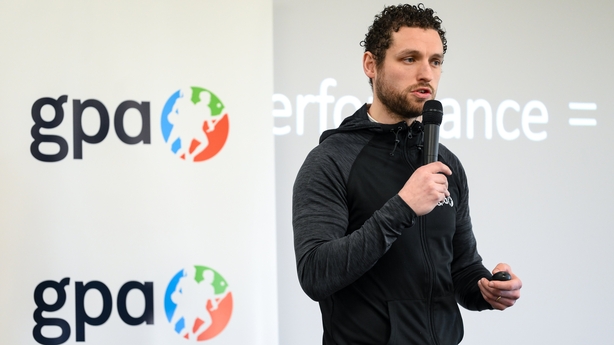The Gaelic Players Association has called on the GAA, LGFA and Camogie Associations to agree and implement a female squad charter.
Following a survey of almost 1,600 inter-county players, the GPA wants to agree an official squad charter for female inter-county players from the 2024 season onwards.
This is the key ask of the players' body "State of Play Equality Report" which was launched by the association on Tuesday.
Research showed female inter-county players reported sustained lower access to sport science supports and more barriers to accessing facilities than male players. Seventy percent of female inter-county players reported difficulties accessing pitches.
There are calls to compensate female players for costs incurred from 2023 onwards and for female specific supports to be implemented.
Last year a contact hours policy for GPA inter-county male players was agreed with the GAA.
We need your consent to load this rte-player contentWe use rte-player to manage extra content that can set cookies on your device and collect data about your activity. Please review their details and accept them to load the content.Manage Preferences
This incorporated two junctures in the season - in December and January - when five inter-county collective training sessions were permitted. Aside from that four sessions per week could be held.
There was no cap on squads, meaning that panels were no longer restricted to 32 players for training and reimbursement.
In that agreement the standard rate, where a player travels on their own to training, has risen from 65c per mile to 70c per mile. It's understood that once a player has clocked up 7,000 miles in travel the rate of expense drops to 40c per mile.
An emphasis was also placed on car-pooling for the season. A rate of €1, called the green rate, was deemed payable where two or more players travel together. That rate was applicable for up to 6,000 miles. It dropped to 60c per mile thereafter.
The charter also agreed minimum standards when it comes to sports science support (including access to physios, strength and conditioning expertise and medical professionals), provision of training and playing gear and travel and nutritional expenses.
Currently, there is no such centralised agreement for the female codes.
But for the first time a request has now been made for the GAA to work with the other two National Governing Bodies (NGBs) in support of female inter-county players in this way.
The call comes as the three organisations continue to work towards full integration, a process that was ignited by a GPA motion at GAA Congress in 2022.

Several weeks ago the GPA delivered a presentation to the Steering Group on Integration (SGI) in Gaelic games on 21 March which included the call for the provision of a female squad charter.
"The WGPA & GPA merged into one association and is now firmly committed to equality for all of our 4,000 strong membership," GPA CEO Tom Parsons told RTÉ Sport.
"The Irish Government made a groundbreaking statement on the value of women, by equalising government grant funding for male & female inter-county players.
"The GPA prioritised structural change in Gaelic Games by bringing a motion on integration to GAA congress, which has ultimately set the GAA, LGFA & Camogie Association on a path towards 'one association for all Gaelic games and built on the principle of equality’.
"Since late 2022, the GPA has again analysed the current ‘state of play’. This report serves to highlight the context in which they continue to participate. It is important to stress there are county boards who are doing excellent work providing a high-performance environment for players, allowing them to reach the best of their potential and demonstrate the pinnacle spectacle of our games.
"Counties are however working within resource constraints that are common across a majority of female sports, which makes it difficult to align on agreed minimum standards across all squads.
"Therefore there remains a great variety and disparity across the provisions and supports available for players in different counties. It is unfortunately the player who suffers from prolonged pain or absence when they don’t have regular access to a centralised physio, or suffers loss of form when they cannot afford to drive home from college for training sessions, or suffers injuries when they don’t have adequate athletic development coaching to prepare them for the demands of an inter-county season, or suffers the health impacts when they don’t have the nutritionist or medical support to help them manage."
Parsons added: "While we respect that the integration process will take some time to achieve, we believe that there are important steps that can be taken towards levelling the playing field for female players as things progress. We should not have to wait until complete integration has been delivered.
"A squad charter for female inter-county players delivered in cooperation between the GAA, LGFA and CA would be one such step and would be a significant statement from the three NGBs in support of equality."
Listen to the RTÉ GAA Podcast on the RTÉ Radio Player, Apple Podcasts, Spotify, or wherever you get your podcasts.
Watch Waterford v Limerick in the Munster Hurling Championship on Sunday from 1.30pm on RTÉ2 and RTÉ Player, follow a live blog on the RTÉ News app or RTÉ.ie/Sport or listen to live commentary on Sunday Sport on RTÉ Radio 1
Watch Roscommon v Galway in the Connacht Football Championship semi-final on Sunday from 3.45pm on RTÉ2 and RTÉ Player, follow a live blog on the RTÉ News app or RTÉ.ie/Sport or listen to live commentary on Sunday Sport on RTÉ Radio 1


